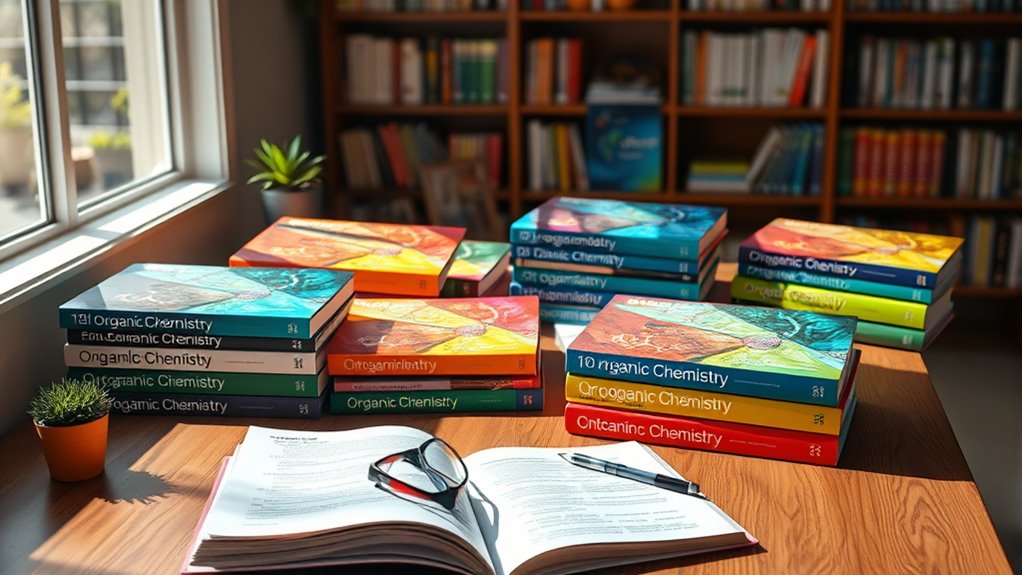I’ve found that the best organic chemistry textbooks for undergraduates combine clear explanations, detailed mechanisms, and engaging visuals to build confidence and understanding. Popular options include McMurry’s and Wade’s textbooks, which are praised for their accessibility and all-encompassing coverage. Digital resources like MasteringChemistry boost interactive learning. If you want a solid starting point and want to explore these top choices, keep going—you’ll discover which one suits your learning style best.
Key Takeaways
- Look for textbooks that balance detailed reaction mechanisms with clear explanations and visual aids to enhance understanding.
- Prioritize books that integrate modern reactions (e.g., Suzuki, Grubbs) and real-world applications relevant to undergraduates.
- Choose resources with comprehensive practice problems, solutions, and digital study tools like MasteringChemistry.
- Select textbooks praised for clarity, logical organization, and accessibility to build confidence in foundational concepts.
- Consider books that include study aids, concept maps, and emphasis on problem-solving to boost learning effectiveness.
Organic Chemistry

If you’re looking for a modern, all-encompassing resource that clearly explains organic chemistry, this textbook is an excellent choice. It emphasizes unifying themes like syn-anti addition, carbocations, and orbital overlap, connecting reactions and concepts seamlessly. The second edition, published in 2012, includes reactions often missing from other texts, such as Grubbs metathesis and Nobel-winning couplings like Suzuki and Heck. It covers current applications in drug synthesis, polymers, and agrochemicals, linking theory to real-world examples. Its clear, mechanistic explanations, colorful diagrams, and focus on fundamental principles make complex ideas accessible, engaging, and perfect for students from beginner to advanced levels.
Best For: students and practitioners seeking a comprehensive, modern, and mechanistically focused organic chemistry textbook that connects theory to real-world applications.
Pros:
- Emphasizes unifying themes and fundamental principles for a cohesive understanding of organic reactions
- Includes modern, practical reactions like Grubbs metathesis and Nobel-winning couplings, keeping content current
- Uses clear explanations, colorful diagrams, and real-world examples to make complex concepts accessible
Cons:
- Some minor errors and outdated content, such as mislabeling coupling constants or removal of certain equations
- The extensive coverage may be overwhelming for complete beginners without prior background
- The cost of the textbook and supplementary materials can be high for some students
Organic Chemistry (MasteringChemistry)

Students seeking flexible, cost-effective ways to master organic chemistry will find the MasteringChemistry digital platform an ideal choice. It offers study anytime, anywhere, with interactive features that enhance understanding. Many students prefer digital formats for easy citation management and quick access. Pairing digital with loose leaf or used editions saves money and improves portability. Users report high satisfaction, citing clear explanations, ample practice problems, and engaging multimedia resources. The platform supports self-study, exam prep, and supplementing online courses. Overall, MasteringChemistry provides an affordable, adaptable, and extensive tool that helps students grasp complex concepts efficiently.
Best For: students seeking flexible, cost-effective, and interactive tools to master organic chemistry through digital resources and supplementary materials.
Pros:
- Provides interactive, mobile-optimized study features that enhance engagement and understanding.
- Offers affordability and flexibility by pairing digital access with loose leaf or used editions, saving costs.
- Supports self-study, exam preparation, and course supplementation with comprehensive multimedia and practice problems.
Cons:
- Digital platform access may require internet connectivity, which could be limiting in some situations.
- Some students may prefer traditional textbooks over digital formats for note-taking and highlighting.
- Variability in edition updates might lead to slight differences in practice questions or content.
Organic Chemistry
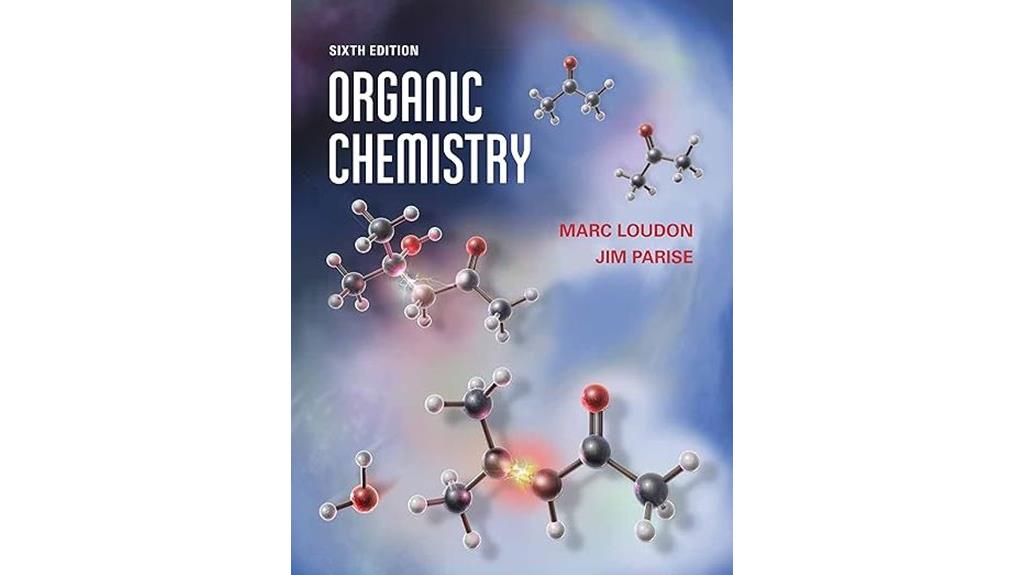
Are you looking for a thorough organic chemistry textbook that balances depth with clarity? I’ve found one that offers extensive coverage, including detailed reaction theory and synthesis, with over 1,600 problems drawn from scientific literature. The writing is clear, accurate, and engaging, making complex concepts accessible without oversimplifying. It’s highly regarded by students and used in top institutions. The book is sturdy but heavy, so an ebook might be more convenient. At under $150, it’s affordable compared to other science textbooks. While some used copies show wear, new editions arrive in great condition, making it a solid choice for serious learners.
Best For: serious students and educators seeking a comprehensive, detailed organic chemistry textbook that combines clarity with depth.
Pros:
- Extensive coverage with over 1,600 problems sourced from scientific literature, enhancing practical understanding.
- Clear, accurate writing style that explains complex concepts without oversimplification, suitable for advanced learners.
- Highly regarded in academic circles and used by top institutions, ensuring credibility and broad acceptance.
Cons:
- The physical book is heavy and sturdy, which may reduce portability; an ebook is recommended for convenience.
- Some used copies may have durability issues like wear and spine separation due to heavy use.
- Limited focus on synthesis proposing or reagent prediction problems, primarily emphasizing reaction understanding.
Chemistry: An Introduction to General, Organic, and Biological Chemistry
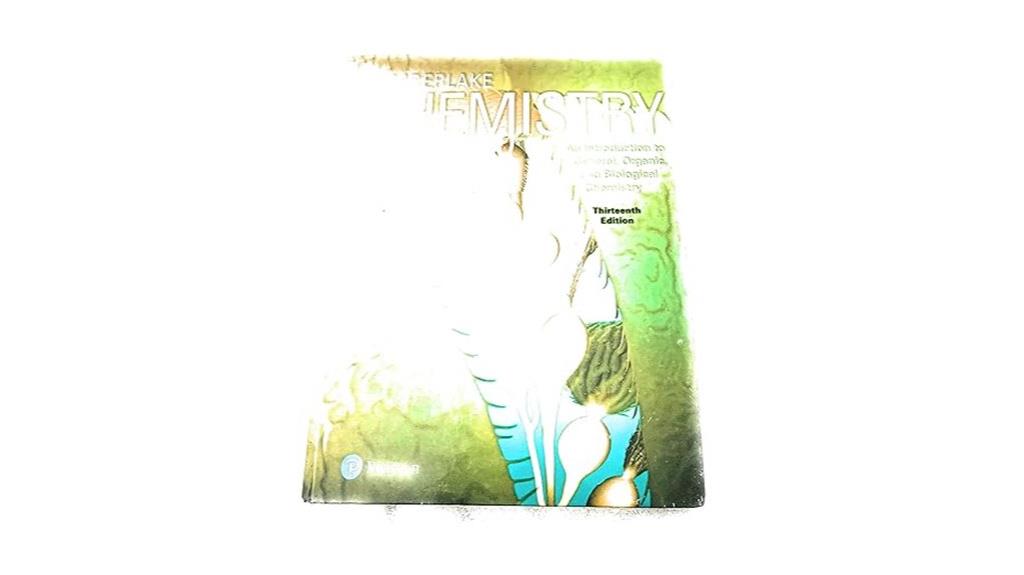
Looking for an accessible introduction to chemistry tailored for beginners? “Chemistry: An Introduction to General, Organic, and Biological Chemistry” is perfect for students in one-semester courses focused on health, biology, or the environment. This book emphasizes relevance, clinical applications, and real-world examples, making complex concepts easier to grasp. It features engaging figures, sample problems, and concept maps that enhance visual learning and problem-solving skills. The 13th edition updates include new stories, practical activities, and tools like “Try it First” and “Connect” to foster critical thinking. Its digital resources, like Pearson eText and Mastering Chemistry, support active engagement and personalized learning.
Best For: beginners in health, biology, or environmental science courses seeking a clear, engaging, and application-focused chemistry resource.
Pros:
- Accessible and easy-to-understand for those new to chemistry
- Emphasizes real-world relevance and clinical applications to enhance learning
- Includes engaging figures, sample problems, and concept maps to support visual and problem-solving skills
Cons:
- Some customers experience issues with access codes not included with new or purchased copies
- Limited communication from sellers can complicate resolving access issues
- Digital resources and supplements may require additional purchases or subscriptions
Organic Chemistry
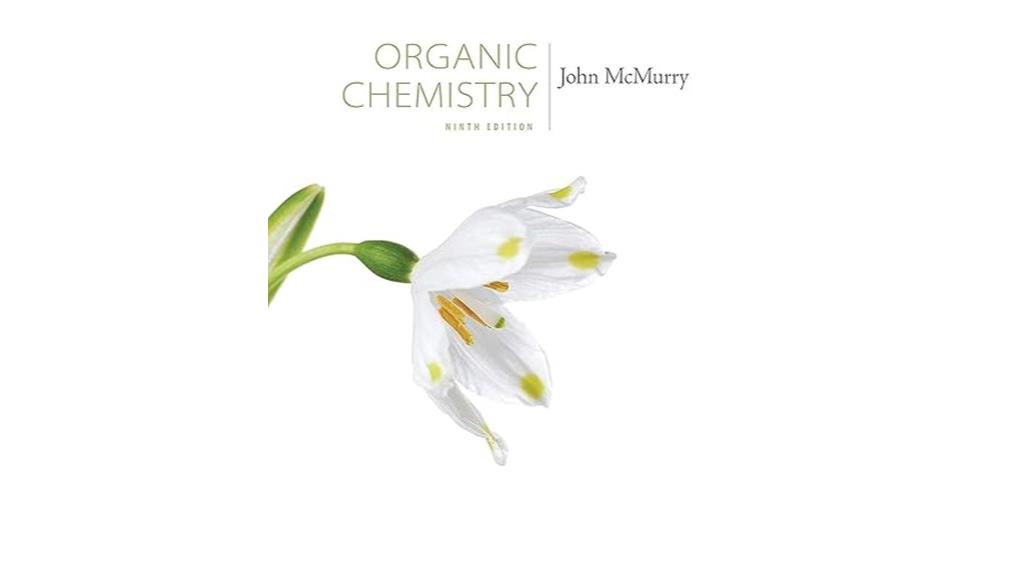
If you’re seeking an organic chemistry textbook that combines clarity, organization, and accessibility, McMurry’s Organic Chemistry stands out as an excellent choice. I’ve found it to be well-structured, making complex concepts easier to grasp. The first edition was beloved, and later editions add even more coverage without sacrificing clarity. Many students, including myself, credit it for high grades and understanding tough topics. The solutions manual is a great companion, reinforcing learning. While the book isn’t perfect—some sections could use more detail—it remains a top pick for mastering organic chemistry, thanks to its engaging explanations and durable quality.
Best For: students and educators seeking a clear, well-organized, and accessible organic chemistry textbook that helps simplify complex concepts and achieve high grades.
Pros:
- Praised for its clarity, logical organization, and engaging explanations.
- Includes a helpful solutions manual that reinforces understanding.
- Durable quality and high value, making it a worthwhile purchase.
Cons:
- Some sections could benefit from more detailed explanations.
- Occasionally the organization may hinder understanding of certain topics.
- Additional specificity in some chapters could improve comprehension.
Organic Chemistry (8th Edition)
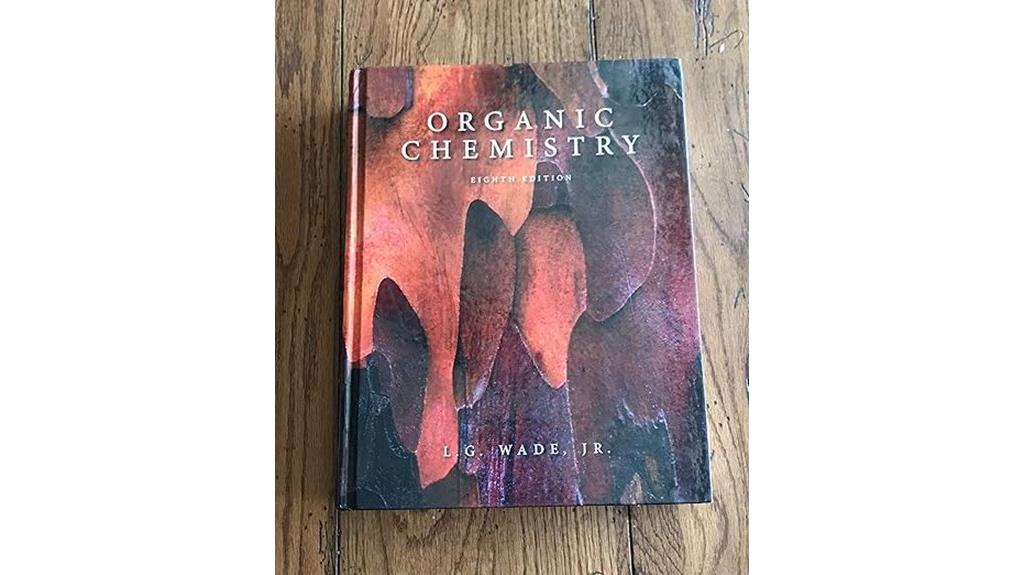
Wade’s Organic Chemistry (8th Edition) stands out as an excellent choice for students who seek a clear, detailed, and systematic approach to mastering complex concepts. I appreciate its logical organization, starting with naming, properties, then synthesis and reactions, reinforced by chapter goals and key mechanism boxes. The book balances scientific rigor with accessibility, providing thorough explanations, illustrations, and problem-solving hints that boost understanding. Many students find it perfect for self-study or coursework, especially because of its emphasis on real-world applications and developing problem-solving skills. Plus, digital resources make studying flexible and convenient, enhancing the overall learning experience.
Best For: students seeking a clear, detailed, and systematic organic chemistry textbook that balances scientific rigor with accessibility for self-study or coursework.
Pros:
- Highly praised for clarity, comprehensive explanations, and visual aids that enhance understanding.
- Organized with logical progression from naming to reactions, reinforced by chapter goals and key mechanism boxes.
- Offers valuable digital resources like online textbooks, problem hints, and interactive features that support flexible studying.
Cons:
- Older editions may have less updated content or less polished digital resources.
- Some used copies can be in poor condition, requiring careful purchasing from reputable sources.
- The cost of newer editions can be high unless students opt for rentals or older versions, which may lack some features.
86 Tricks To Ace Organic Chemistry
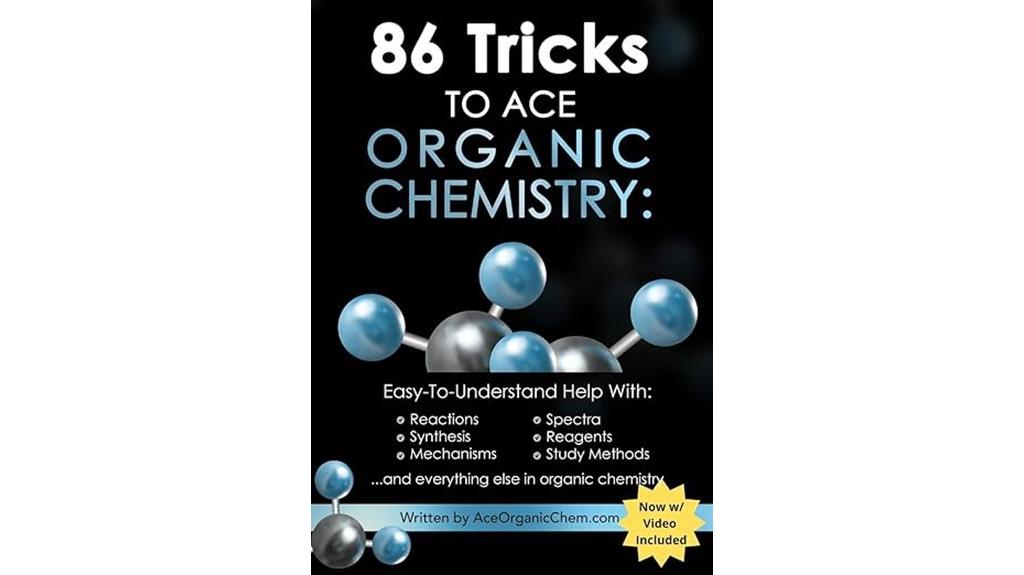
Are you already familiar with the basics of organic chemistry but need quick, effective strategies to improve your exam performance? “86 Tricks To Ace Organic Chemistry” is the perfect companion for students who want to boost their understanding without wading through dense textbooks. This guide offers shortcuts, tips, and tricks focused on reaction mechanisms, nomenclature, and problem-solving techniques. It simplifies complex concepts like SN1, SN2, and acid-base reactions with mnemonics and analogies, making them easier to remember. Designed for those with some background knowledge, it helps you quickly review key topics, build confidence, and sharpen your exam skills efficiently.
Best For: students with some foundational knowledge of organic chemistry seeking quick review strategies, exam tips, and shortcuts to improve their problem-solving skills.
Pros:
- Provides clear mnemonics and analogies that simplify complex concepts.
- Focuses on essential topics like reaction mechanisms, nomenclature, and key reaction types.
- Offers practical shortcuts and tips that save time during studying and exams.
Cons:
- Not suitable for complete beginners without prior organic chemistry experience.
- May lack in-depth coverage of advanced or niche topics.
- Some users report variability in physical quality or presentation of the material.
Organic Chemistry
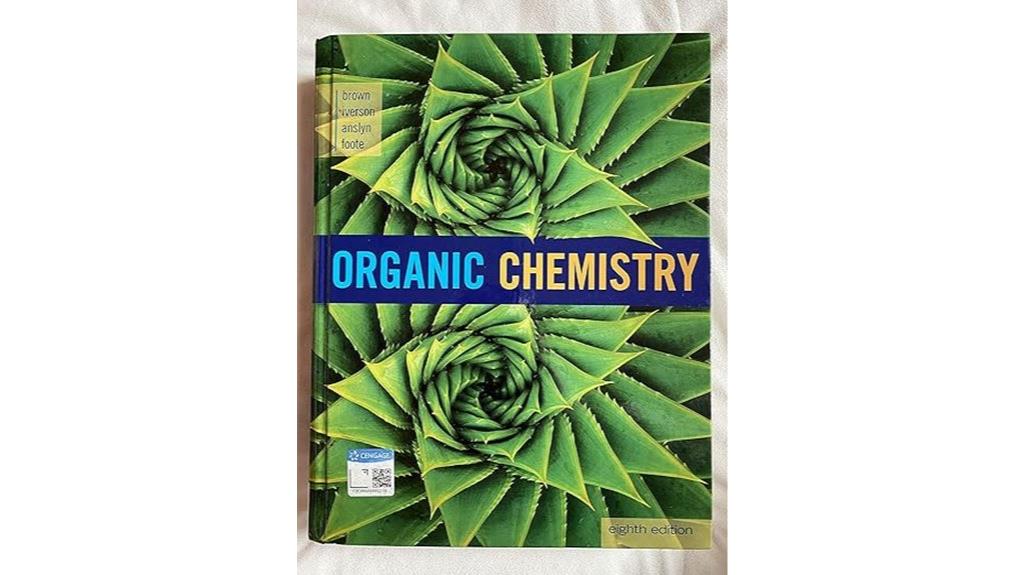
Students who are serious about mastering organic chemistry will find “Organic Chemistry” 8th Edition especially helpful, thanks to its detailed step-by-step reaction mechanisms and focus on core skills like bond-breaking and bond-making. The book emphasizes practical skills through biological examples, roadmap problems, and in-text learning tools, making complex topics more approachable. While in-depth, some students find the companion solutions manual essential, though it can be frustrating to use. Access to online videos adds value, but clarity about costs and access remains unclear. Overall, this textbook offers a thorough and engaging resource, especially when paired with supplementary materials to enhance understanding.
Best For: serious premed students and individuals seeking a comprehensive, step-by-step approach to mastering organic chemistry concepts and reaction mechanisms.
Pros:
- Emphasizes detailed, clear reaction mechanisms and core skills like bond-breaking and bond-making.
- Incorporates biological examples and practical learning tools to make complex topics accessible.
- Contains supplementary resources such as videos and a solutions manual that enhance understanding.
Cons:
- Companion solutions manual can be difficult and frustrating to use.
- Online video access and additional resource costs are often unclear and may require separate purchases.
- The textbook is lengthy and may be overwhelming for some students despite its thorough coverage.
Chemistry: Introduction to General, Organic, and Biological Chemistry (11th Edition)
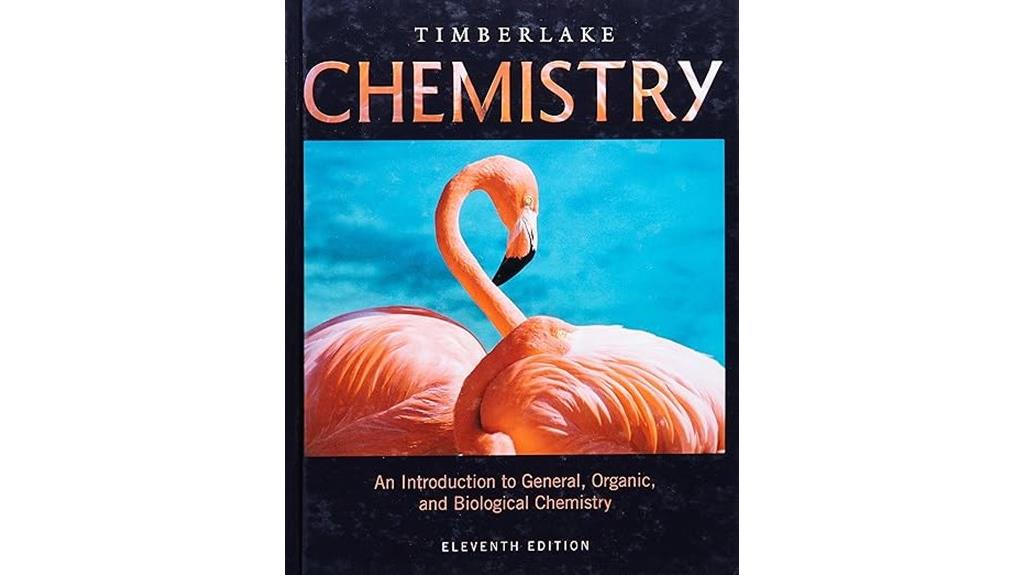
If you’re seeking an organic chemistry textbook that simplifies complex concepts and emphasizes real-world health applications, this 11th edition of *Chemistry: An Introduction to General, Organic, and Biological Chemistry* is an excellent choice. It’s designed to be accessible for beginners, with friendly explanations, engaging visuals, and practical examples related to health fields like nursing and environmental science. The book includes step-by-step problems, concept checks, and varied questions to reinforce understanding. Its clear structure and relevant content make it ideal for self-study or courses, helping students build confidence and achieve high grades even if they’re new to chemistry.
Best For: students and self-learners seeking an accessible, practical introduction to organic and biological chemistry with real-world health applications.
Pros:
- Clear explanations and engaging visuals make complex concepts easier to understand
- Includes step-by-step problems, concept checks, and varied questions to reinforce learning
- Suitable for beginners with no prior chemistry knowledge, supporting high grades and confidence
Cons:
- Older editions may lack access codes for online resources, requiring additional purchase
- Occasional inaccuracies in questions or definitions can cause minor confusion
- Some users find the physical packaging or binding less durable over time
Organic Chemistry, 6th Edition
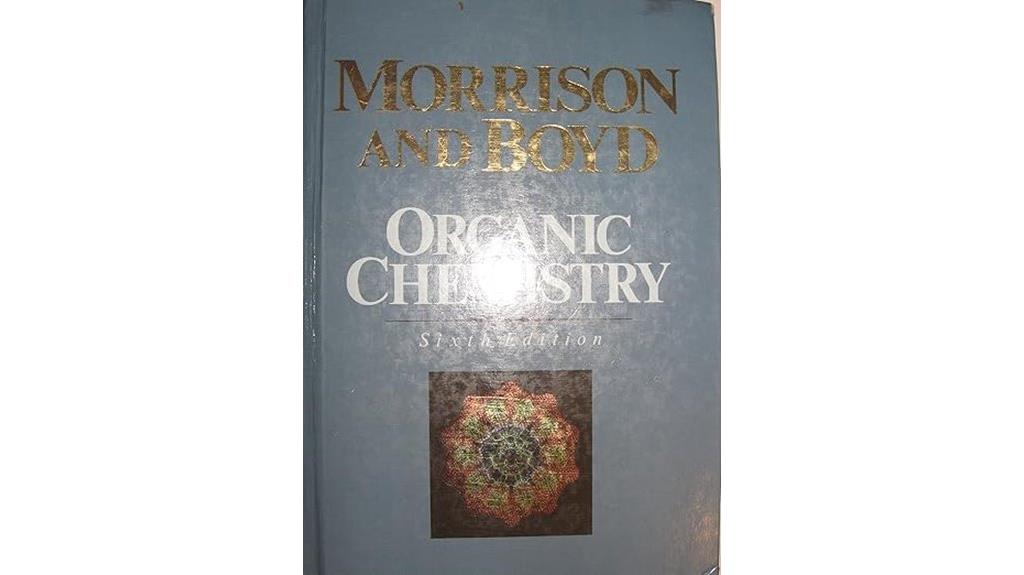
The “Organic Chemistry, 6th Edition” stands out as an excellent resource for college-level students, especially those in pharmacy programs or seeking a detailed supplement to more modern textbooks. Despite its age, it’s in excellent condition, lightly used, and affordably priced, making it accessible worldwide. It’s particularly valuable for its thorough explanations, spectra analysis exercises, and emphasis on experimental evidence, though its images are somewhat crude compared to newer visuals. While dense and challenging for beginners, it’s highly regarded by instructors and advanced students alike. Choosing a used copy supports sustainability and offers a cost-effective way to deepen your understanding of organic chemistry.
Best For: college-level students, especially those in pharmacy programs or seeking a detailed supplement to modern organic chemistry textbooks.
Pros:
- Highly detailed explanations and comprehensive coverage of organic chemistry principles.
- Emphasizes experimental evidence and spectra analysis, enriching understanding.
- Lightly used and affordable, making it accessible worldwide and environmentally friendly.
Cons:
- Images and graphics are somewhat crude and outdated compared to modern visuals.
- Dense and challenging for beginners, requiring additional resources for foundational learning.
- Some second-hand copies may have issues with durability or print quality.
Chemistry Made Easy Study Guide
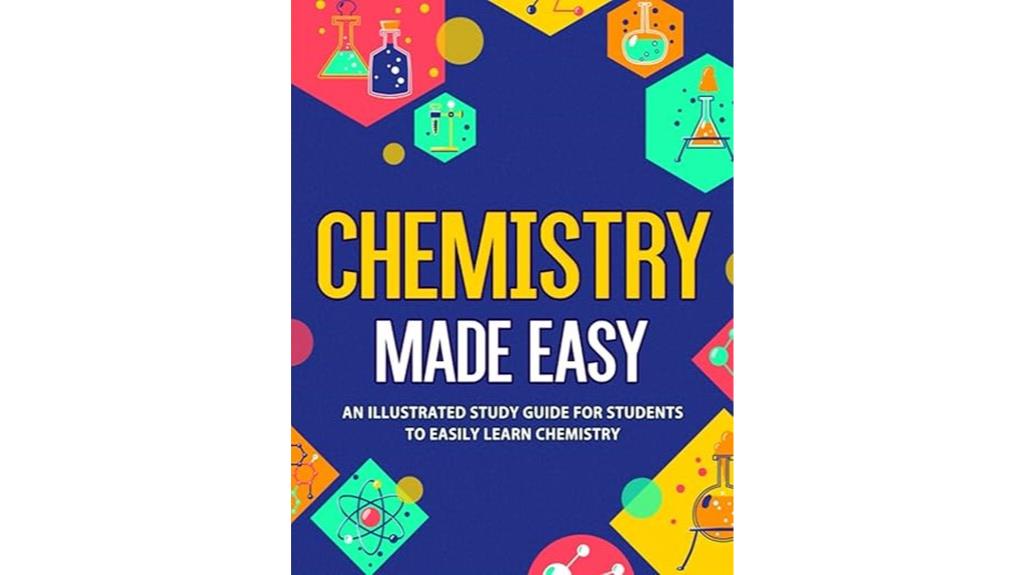
Looking for a straightforward way to grasp chemistry fundamentals? “Chemistry Made Easy: An Illustrated Study Guide” is perfect for beginners and adult learners. It uses over 300 illustrations to make complex ideas simple and visual. The book covers essential topics like matter, atoms, bonds, chemical reactions, and organic molecules, organized into 20 clear chapters. Its layout emphasizes visuals, helping you understand concepts quickly. Many users find it practical and easy to read, boosting confidence and grades. While it has minor typos and outdated info, overall, it’s a solid resource for building a strong chemistry foundation or invigorating your knowledge.
Best For: beginners, adult learners, and anyone seeking a clear, visual introduction to chemistry fundamentals.
Pros:
- Over 300 illustrations that enhance understanding and retention
- Organized into 20 comprehensive chapters covering a wide range of topics
- Easy-to-read layout that builds confidence and improves grades
Cons:
- Contains minor typos and some outdated information, such as an incorrect periodic table
- Some concepts may lack depth for advanced learners
- Slightly outdated data could require supplementary resources for the most current information
Organic Chemistry Decoded: Master Orgo with Step-by-Step Solutions
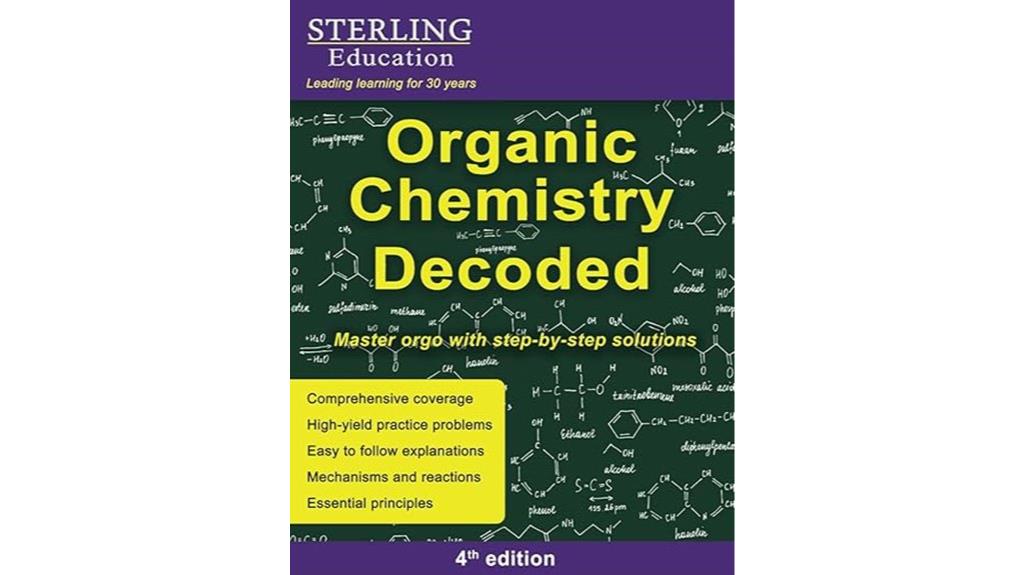
Are you struggling to grasp complex organic chemistry concepts? “Organic Chemistry Decoded: Master Orgo with Step-by-Step Solutions” is an ideal resource for students at all levels who need clear explanations and practical problem-solving guidance. This book offers detailed solutions, hundreds of practice questions, and mnemonic devices to simplify challenging topics. It emphasizes understanding fundamental principles and relationships between concepts through logical organization. The step-by-step problem-solving strategies help build critical thinking skills and boost confidence. Used alongside your coursework, it’s a powerful tool for mastering organic chemistry, turning confusing topics into manageable lessons.
Best For: students of all levels seeking clear explanations, detailed solutions, and practice problems to master organic chemistry concepts effectively.
Pros:
- Offers comprehensive step-by-step solutions and detailed explanations to enhance understanding
- Contains hundreds of practice questions with answer keys and brief explanations for reinforcement
- Uses mnemonic devices and logical organization to simplify complex topics and aid memory
Cons:
- Best used alongside textbooks and coursework due to the complexity of organic chemistry concepts
- May be overwhelming for absolute beginners without prior foundational knowledge
- Requires consistent practice and active engagement to fully benefit from the resource
Introduction to General, Organic, and Biochemistry

If you’re pursuing a nursing degree or preparing for a general chemistry course, the “Organic Chemistry Textbooks” can be be an invaluable resource. They offer thorough explanations of fundamental concepts in general, organic, and biochemistry, with problem-solving steps and real-world applications. Many editions are in excellent condition and include helpful solutions manuals. Rental options save you money, making them cost-effective. While some copies may have errors or missing terms, overall, these books are highly recommended for college students, including those in nursing and high school classes. They help build a solid foundation for understanding chemistry and its practical relevance.
Best For: Nursing students, college-level chemistry students, and high school students preparing for general, organic, and biochemistry courses.
Pros:
- Thorough explanations of fundamental concepts with problem-solving steps and real-world applications.
- Includes helpful solutions manuals and current topics in chemistry.
- Cost-effective rental options that save money compared to purchasing new or used textbooks.
Cons:
- Some editions or copies may contain errors or missing terms, affecting reliability.
- The overall quality of physical copies can vary, with some being worn or damaged.
- Negative reviews mention inaccuracies and missing chemical terminology that could hinder learning.
Study Guide/Solutions Manual for Organic Chemistry
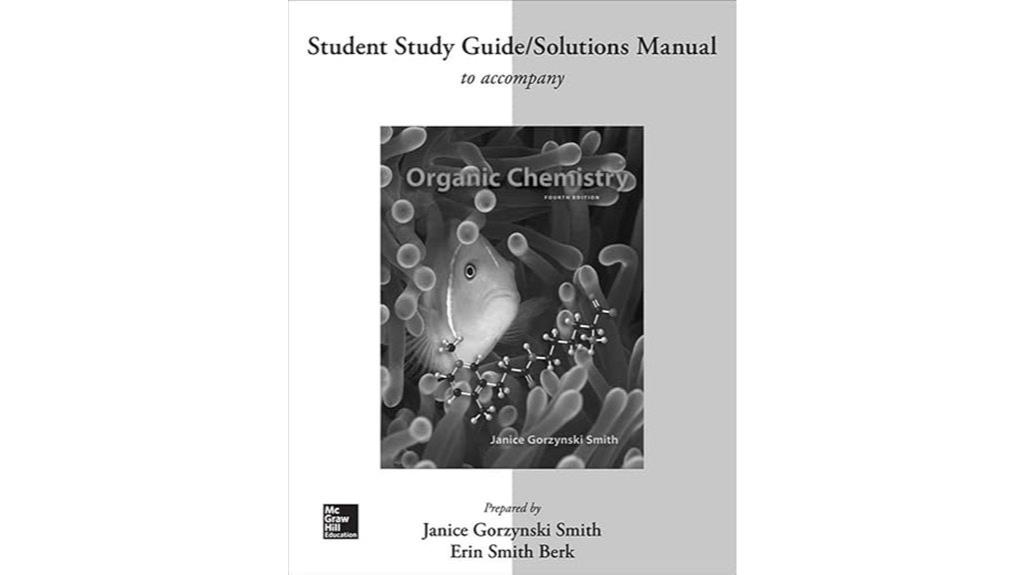
The Study Guide/Solutions Manual for Organic Chemistry is an essential resource for students using Janice Gorzynski Smith’s textbook, especially when instructor guidance isn’t available. It offers detailed, step-by-step solutions for all in-chapter and end-of-chapter problems, helping you verify answers and clarify concepts. The manual includes chapter summaries, key ideas, practice exams, and quick reviews to reinforce learning. Well-written with thorough explanations, it’s designed to boost your understanding and confidence. While some editions may have minor inaccuracies or missing pages, overall, it’s highly valued as a “life-saver” for mastering organic chemistry and improving performance.
Best For: organic chemistry students seeking detailed, step-by-step solutions and comprehensive study support to enhance understanding and exam performance.
Pros:
- Provides thorough, detailed explanations for all problems, aiding comprehension.
- Includes chapter summaries, key concepts, practice exams, and quick reviews for effective study reinforcement.
- Highly praised as a “life-saver,” helping students verify answers and clarify difficult concepts.
Cons:
- Some editions may have minor inaccuracies or missing pages, which can hinder study efforts.
- The manual is costly, potentially making it less affordable for some students.
- Occasional issues with physical condition, such as missing pages or damage, may affect usability.
Study Guide/Solutions Manual for Organic Chemistry
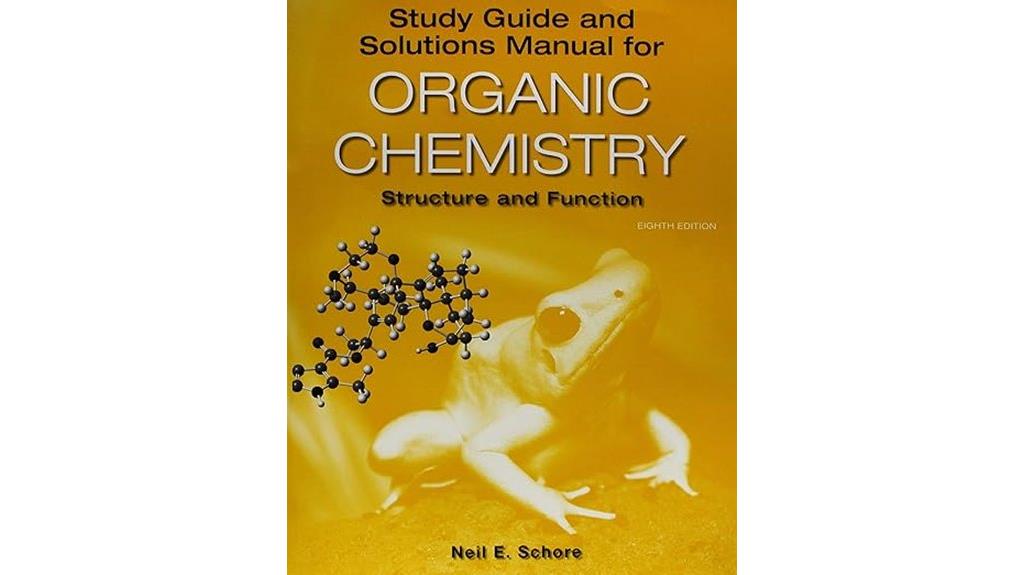
Students seeking targeted help with organic chemistry problems will find Neil Schore’s Study Guide/Solutions Manual particularly valuable. This manual offers solutions to end-of-chapter problems, detailed explanations, chapter summaries, and a glossary, making it a helpful supplement for understanding reasoning processes and reinforcing textbook concepts. While not a standalone teaching resource, it’s ideal for homework review and self-assessment. I recommend using it as a check rather than a crutch, ensuring you grasp concepts before relying on answers. Keep in mind, the physical copy is preferable, as the Kindle version often has missing or incomplete solutions, which can hinder effective studying.
Best For: students enrolled in organic chemistry courses seeking detailed solutions and supplementary explanations to enhance their understanding and review of textbook material.
Pros:
- Provides detailed solutions to end-of-chapter problems that aid in comprehension.
- Includes chapter summaries, introductions, and a glossary to reinforce key concepts.
- Serves as a valuable review resource, especially when used alongside the textbook.
Cons:
- The Kindle version often has missing or incomplete solutions, limiting accessibility.
- Some answers are not fully explained, potentially causing confusion.
- Not a comprehensive teaching resource; requires prior knowledge and supplementary study.
Factors to Consider When Choosing Organic Chemistry Textbooks for Undergraduates

When selecting an organic chemistry textbook, I focus on clear and appropriately detailed content that matches my learning level. I also consider whether the book offers effective visual aids, like diagrams and reaction mechanisms, to enhance understanding. Finally, I weigh the quality of practice problems and decide between digital or print formats based on my study preferences.
Content Clarity and Depth
Have you ever noticed how clear explanations make complex organic reactions easier to understand? When a textbook presents concepts in a well-organized way, it helps me grasp reaction mechanisms and fundamental ideas more efficiently. The depth of content should strike a balance—covering enough to be thorough but still accessible enough to prevent overwhelm. Good textbooks often use diagrams, reaction schemes, and color-coded flowcharts to clarify detailed processes, making them easier to remember. Well-structured chapters that gradually build from basics to advanced topics help me learn step-by-step without confusion. Additionally, clear distinctions between core ideas and nuanced details allow me to focus on what’s most important for exams and practical use. Overall, clarity and balanced depth make studying organic chemistry less intimidating and more manageable.
Visual Learning Aids
Have you noticed how visual aids can transform complex organic chemistry concepts into more approachable ideas? Effective textbooks use detailed diagrams, color-coded reaction mechanisms, and molecular models to enhance understanding. Illustrations like stereochemical structures, electron flow arrows, and reaction pathways help students grasp intricate topics more intuitively. Incorporating 3D models or interactive animations can further improve spatial awareness of molecular geometry and stereochemistry. High-quality, clearly labeled images and reaction schemes are essential for highlighting key features such as regioselectivity and stereoselectivity. Well-designed visual tools make abstract concepts more concrete, encouraging active learning and better retention. When choosing a textbook, look for those that prioritize visual clarity and employ diverse visual aids to make challenging topics accessible and engaging.
Mechanistic Approach Emphasis
Visual learning aids are invaluable for making complex organic chemistry concepts accessible, but selecting a textbook that emphasizes mechanisms takes understanding a step further. A mechanistic approach helps me grasp how and why reactions occur, not just what happens. Textbooks focused on mechanisms provide detailed, step-by-step explanations of bond-making and bond-breaking events, fostering deeper insight. This approach shifts my thinking from memorizing reactions to understanding the underlying principles driving them. It encourages me to analyze new reactions by applying fundamental concepts, improving problem-solving skills and critical thinking. By emphasizing reaction pathways and electronic effects, these textbooks enable me to predict outcomes more confidently and develop a solid conceptual foundation essential for mastering organic chemistry.
Practice Problem Quality
What makes practice problems truly effective in an organic chemistry textbook? First, they should be numerous, varied, and reflect the types of questions you’ll see on exams and in research. Well-designed problems include detailed solutions or hints, helping you grasp reaction mechanisms and core concepts. They should range from simple checks of understanding to challenging synthesis or mechanism questions, supporting your progressive learning. Incorporating problems from current research or advanced applications can connect theory to real-world chemistry. Clear, consistent formatting and answer keys are essential for self-assessment, allowing you to identify areas for improvement. High-quality practice problems not only reinforce knowledge but also build confidence and problem-solving skills essential for success in organic chemistry.
Digital vs. Print Options
Choosing the right format for your organic chemistry textbook can substantially impact your learning experience. Digital textbooks are convenient, offering portability, searchable content, and interactive features like animations and quizzes that can enhance understanding. They’re often more affordable and can be quickly updated to include the latest information. On the other hand, print textbooks provide tactile engagement, making note-taking easier and reducing dependence on electronic devices or internet access. They tend to be more durable, ideal for long-term reference. Your choice should also align with your learning style—visual, kinesthetic, or reading preference. Additionally, consider device compatibility, software requirements, and access to online resources. Weighing these factors helps you select the format that best supports your study habits and enhances your grasp of organic chemistry.
Cost and Accessibility
When selecting an organic chemistry textbook, cost and accessibility are crucial factors to take into account. New editions can cost over $150, but used or older versions are often much cheaper, offering significant savings. It’s also important to evaluate whether digital resources, like online access codes and supplementary materials, are included or require extra purchases. Check if digital formats, such as eTexts or online platforms, are compatible with your devices and if they can be accessed offline or across multiple devices. Consider the durability and portability of the physical textbook—sometimes an electronic version is more convenient and resistant to wear. Comparing the costs of new, used, or loose-leaf editions helps you find the most budget-friendly option without sacrificing quality.
Up-to-Date Reactions
Selecting an organic chemistry textbook isn’t just about cost; ensuring it covers the latest reactions can considerably impact your understanding and preparation. A good textbook should include recent breakthroughs like Grubbs metathesis, Suzuki, Heck, and Buchwald-Hartwig couplings, which are essential in modern synthesis. It should also explain current reaction mechanisms and reagents, reflecting ongoing research and industrial practices. Focus on books that emphasize contemporary topics like stereoselectivity, asymmetric catalysis, and pericyclic reactions, so you’re grounded in both classic and cutting-edge methods. Updated reaction coverage helps you connect theory to real-world applications, whether in research or industry. Choosing a textbook that stays current ensures you’re learning relevant, practical chemistry that prepares you for future challenges.
Frequently Asked Questions
Which Organic Chemistry Textbooks Are Best for Visual Learners?
You’re asking about the best organic chemistry textbooks for visual learners. I recommend books with lots of colorful diagrams, clear illustrations, and visual summaries. “Organic Chemistry” by David R. Klein is great because it includes helpful visuals and step-by-step explanations. Also, “Organic Chemistry as a Second Language” by David Klein offers visual aids that make complex concepts easier to grasp. These resources make learning more engaging and accessible for visual learners like you.
How Do I Choose a Textbook for Self-Study in Organic Chemistry?
They say, “You are what you read,” and that’s true for self-study. When choosing an organic chemistry textbook, I focus on clarity, explanations, and practice problems. I look for a book that matches my learning style—whether I prefer visual aids or detailed concepts. I also check reviews, sample chapters, and whether it covers fundamental topics thoroughly. A good textbook should make challenging concepts feel manageable and motivate you to keep learning.
Are There Affordable Organic Chemistry Textbooks With Comprehensive Content?
When looking for affordable organic chemistry textbooks with extensive content, I recommend checking out open-access options like Khan Academy or MIT OpenCourseWare, which offer detailed lessons for free. Additionally, older editions of popular textbooks like “Organic Chemistry” by Clayden or Solomons can be budget-friendly and still packed with valuable information. Don’t forget to explore online marketplaces for used books—often, you can find great deals that fit your budget.
Which Textbooks Include Real-World Applications of Organic Chemistry?
I’ve researched how textbooks incorporate real-world applications of organic chemistry, and it’s clear many include practical examples to enhance understanding. For instance, “Organic Chemistry” by David Klein offers case studies on pharmaceuticals and materials, while “Organic Chemistry as a Second Language” connects concepts to everyday life. These books help students see the relevance of organic chemistry beyond the classroom, making learning more engaging and meaningful.
How Do Online Resources Complement Traditional Organic Chemistry Textbooks?
Online resources really enhance my understanding of organic chemistry by providing interactive tools, videos, and practice problems that textbooks alone can’t offer. They allow me to visualize complex reactions and concepts more clearly. I find that combining these digital tools with my textbooks creates a well-rounded learning experience, making tough topics more accessible and engaging. This synergy helps me grasp organic chemistry more effectively and stay motivated throughout my studies.
Conclusion
Choosing the right organic chemistry textbook can feel overwhelming, but remember, “A journey of a thousand miles begins with a single step.” Whether you prefer detailed explanations or quick study guides, the best book is the one that fits your learning style. With the right resource, you’ll build confidence and master organic chemistry in no time. Keep exploring, stay curious, and success will follow—happy studying!
